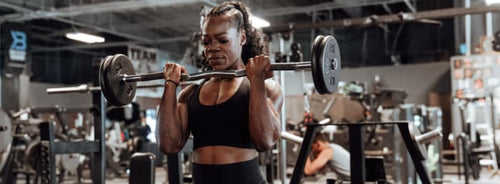If you've ever rolled out of bed after leg day and discovered your legs are stiff, sore, and angry, then you've experienced the wrath of delayed onset muscle soreness, or DOMS.
DOMS is common for bodybuilders and performance athletes alike, and is more often a sign of working to hypertrophy than pushing your workout too far.
When you work out to failure, your muscles must repair small tears in your muscle fibers caused by the stress of exercise. These tears cause muscle inflammation, which leads to soreness about 1 to 2 days after a major workout. There you have it: DOMS in a nutshell.
According to Matt Unthank, a certified strength coach and fitness director at Crossover Symmetry, muscle soreness can even be a positive sign for performance athletes. “It suggests an elevation in intensity and the inclusion of novel movements to a workout program, both of which are extremely good things for a training program," Unthink explained to NBC News.
When you work to hypertrophy as often as we do, however, you may never totally rid yourself of DOMS. Still, there's plenty you can do before and after you workout to minimize muscle soreness and fatigue the next day.
Here are five ways you can make tomorrow less painful:
1. Drink Your Morning Cup of Joe
We would never keep you from your morning caffeine jolt! As it turns out, caffeine can also be a helpful stimulant for easing muscle soreness and fatigue—especially if you have to get up and go to the gym in the morning.
Numerous studies point to the benefits of caffeine in strength and endurance workouts. In one recent study conducted by faculty at Florida Atlantic University, female weightlifters achieved a greater bench press 1RM after supplementing with caffeine. The stimulant may even make exercise feel easier—simply because it activates the nervous system and lessens the effects of stress and pain.
If you're not a coffee drinker, there are other ways to introduce caffeine into your diet, like supplements and low-sugar energy drinks. But, says Dr. Kevin Campbell, you should always exercise caution when taking caffeine supplements. "[The] caffeine content in [energy drinks] typically ranges from 50 to 500 milligrams, compared to 100 milligrams in a regular cup of coffee," Campbell explains at U.S. News & World Report.
In addition to processing heart-pounding levels of caffeine, athletes who consume too much of the stimulant could find their sleep disrupted or experience the caffeine "jitters."
If you're thinking of using caffeine supplements to reduce muscle soreness or experience a powerful boost during your workout, consider looking for alternative stimulants that won't elevate your heart rate or blood pressure.
Supplements made with theacrine, for example, release powerful bursts of energy that will help you make major gains—without giving you that jittery feeling of traditional caffeine supplementation.
2. Master Your Pre- and Post-Workout Nutrition
When you work out as hard as we do, giving your body the right fuel will make or break you during periods of rest and recovery. Without the right balance of protein and carbohydrates in your meals and supplements, you're bound to feel sore, fatigued, and even a little spacey after a tough training session.
Protein helps speed the process of muscle recovery, and it's the most important macronutrient for you to master to avoid soreness and fatigue. When consumed within 30 to 90 minutes of a major workout, it can lessen symptoms of muscle soreness and help build more muscle, too.
According to The Conversation, the average performance athlete requires about two to three times the amount of protein as the average person in order to stay in tip-top shape for competition. For most athletes, that means using protein supplements—both to meet their body's needs and to help with recovery.
Whey powder, which is metabolized quickly by the body, and casein protein, which is metabolized more slowly, are two of the most common supplements for performance athletes looking to increase mass, build muscle, and recover quickly from training hard. But it's important to remember to balance your protein intake from pre- or post-workout supplements with lean sources of whole foods, like chicken, turkey, fish, and eggs.
If that sounds like a lot of protein in your diet—it is. As performance athletes, we should consume about 30-35% of our daily calories in the form of protein, especially when we're in a bulking phase. Anything less, and you won't have the energy to fuel tough workouts, or speed along muscle recovery.
3. Supplement to Minimize Muscle Fatigue
Supplements containing creatine and L-Carnitine also minimize muscle soreness and fatigue during exercise—but they're not a cure all for the muscle soreness that sets in after a workout is over.
Creatine, an amino acid that helps athletes add muscle, has been shown to ease muscle recovery throughout even the toughest workouts. It won't eliminate DOMS from your life in the days after you train, but it will give your muscle fibers the recovery power they need to repair and synthesize new muscle as exercise breaks them down.
Like creatine, L-Carnitine is an amino acid that speeds the recovery process—and some studies suggest that it might both reduce muscle damage and soreness. For that reason, it's likely more effective than creatine in countering your post-workout soreness blues.
L-Carnitine works well with protein and carbohydrates, and requires the right balance of nutrients to be most effective. Consume after your workout with a balanced meal to maximize your recovery.
Branch Chain Amino Acids or BCAAs, are the building blocks of protein and are essential because your body doesn’t make them on its own, but through foods you eat and supplementation. BCAAs refer to the amino acids leucine, isoleucine, and valine. A scientifically backed 2:1:1 ratio of these amino acids can help decrease muscle fatigue, speed up recovery, and keep you hydrated.
4. Massage Your Muscles
Sometimes the best way to minimize muscle soreness is the old-fashioned way: massage your muscles with a foam roller or opt for a light tissue massage.
According to a new study published in Frontiers in Physiology, in a comparison between recovery methods like active recovery, massage, and compression garments, massage and cold therapy worked best for preventing delayed onset muscle soreness in performance-level athletes.
Light tissue massage helps release lactic acid from the muscle and speed recovery after a workout. But be warned that your muscles may be too sore for a deep body massage—it might even bring on cramps or muscle spasms. It's best to wait if you feel truly sore.
Can't afford a masseuse? Use a foam roller after your workout, suggests physical therapist
Kelly Starrett. “Foam rolling ‘turns on’ your parasympathetic nervous system which is responsible for helping you unwind and recover,” Starrett explained to Men's Health.
So there's a scientific reason you see professional athletes jump into ice baths and get pampered with massages after a big game—it actually works!
5. Embrace Active Recovery and Rest
While it's in our nature to push each workout to the limits, every good athlete knows how important active recovery and rest are to the process.
If you're a performance athlete or bodybuilder, active recovery can include light cardio, yoga, swimming, or even more intensive corrective exercises. Just be sure to program an exercise that will help you get up and move your body without putting the same stress on your muscles as you would during a tough resistance workout.
For more intense training programs, active recovery can even include core and balance work mixed with strength conditioning, like the battle ropes or sled pulls. These exercises can help you stay in peak performance form while improving your overall balance, addressing potential muscle imbalances, or strengthening your overall aerobic conditioning. For a full active recovery program, check out these training suggestions from Bodybuilding.com.
And don't discount the actual advantages of rest when it comes to muscle repair. It's crucial for all athletes to take a few days off at the gym—even if they're gearing up for competition. You should also log between 7 and 9 hours of sleep at night to fully recover.
"Your body’s natural production of growth hormone (muscle-building chemical) increases during deep stages of sleep, as does protein synthesis," reports senior digital editor Brittany Smith at Men's Journal. Without full-body rest and relaxation, you could be inhibiting your gains and making it even harder for your muscles to recover from your monster training sessions.


